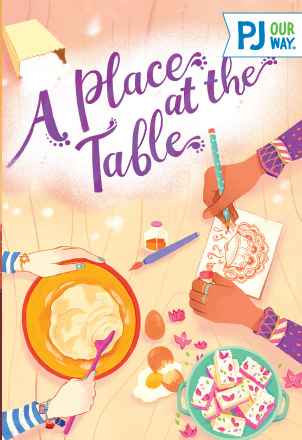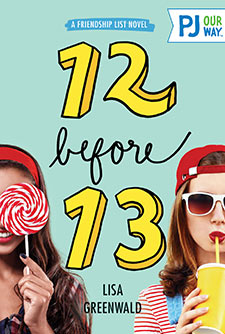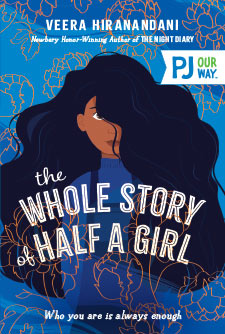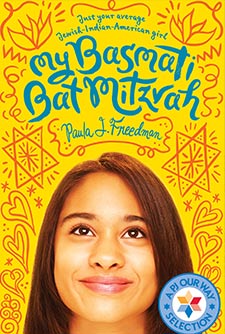A Place at the Table
Elizabeth and Sara are both in 6th grade, and they’re both worried about their mothers — but the similarities end there. Can the two girls overcome their differences and agree on an award-winning recipe for their school’s International Food Festival?
Average Rating
( hint: Login to leave a review! )
162 Reviews
Leave Review
What the Book Is About
Jewish Content & Values
Positive Role Models
Content Advisory
Talk It Over
More for You
What the Book Is About
When 6th graders Elizabeth and Sara meet in an after-school South Asian cooking class, it seems like they have nothing in common. Elizabeth is Jewish, she’s been in the public school her whole life, and she loves cooking. Sara just transferred from a small Islamic school, she loves to draw, she’s only in the cooking class because her mother happens to be the teacher.
As the girls get to know each other, they learn they share a lot more than they ever realized. Both girls are worried about their mothers; Elizabeth’s mother has been struggling with depression ever since her own mother, Elizabeth’s grandmother, died back in England. Meanwhile, Sara’s mother runs a struggling catering business, and money is tight in the family. Plus, neither girl is quite sure where she belongs; Elizabeth is Jewish, but is she Jewish enough? And as a Pakistani-American, Sara and her family face racist comments on a regular basis, including from Maddy, Elizabeth’s best friend.
When the girls are paired up to compete in the school’s International Food Festival, they realize they make good cooking partners. But can they overcome their differences and trust each other enough to become good friends?
As the girls get to know each other, they learn they share a lot more than they ever realized. Both girls are worried about their mothers; Elizabeth’s mother has been struggling with depression ever since her own mother, Elizabeth’s grandmother, died back in England. Meanwhile, Sara’s mother runs a struggling catering business, and money is tight in the family. Plus, neither girl is quite sure where she belongs; Elizabeth is Jewish, but is she Jewish enough? And as a Pakistani-American, Sara and her family face racist comments on a regular basis, including from Maddy, Elizabeth’s best friend.
When the girls are paired up to compete in the school’s International Food Festival, they realize they make good cooking partners. But can they overcome their differences and trust each other enough to become good friends?
Jewish Content & Values
- Elizabeth Shainmark and her family are Jewish. She goes by her Hebrew name, Elisheva, at Hebrew school, and she anticipates celebrating her bat mitzvah. She wears a Star of David charm bracelet that she touches when she feels anxious or stressed.
- Even though her mother doesn’t always feel up to it, Elizabeth encourages the family to celebrate Shabbat by lighting candles and saying hamotzi, the blessing over the challah. Elizabeth enjoys attending synagogue with her father.
- When Bubbe (Elizabeth’s grandmother) visits for Hanukkah, she makes sufganiyot (doughnuts) from scratch, and teachers Elizabeth’s mother how to make latkes (potato pancakes). The family lights the menorah and teaches Sara and her younger brothers how to play dreidel.
Positive Role Models
- Sara is a creative, supportive daughter who helps her parents by caring for her younger twin brothers. She is pushed beyond her comfort zone at a new school and learns to make new friends.
- Elizabeth loves cooking, her friends, and her family. She encourages her family to be more Jewishly engaged, and she works hard to confront her own biases.
- Sara’s mother Hina is a supportive, hard-working parent who stays true to her culture and values and holds her children and students to high standards.
- Elizabeth’s mother Nicole overcomes her depression and grief to make a new friend, re-engage with her family, and pass her citizenship test.
- Elizabeth's bubbe helps the family celebrate Hanukkah by making latkes and sufganiyot. She’s an important source of support for Elizabeth, and she helps Nicole make an appointment with a doctor to talk about her grief.
Content Advisory
Elizabeth’s father refers to antisemitic graffiti in the local high school, and Maddy Montgomery makes several racist statements such as “stupid Arabs" and “go back to where you belong" toward Sara and other South Asian students. The principal of Elizabeth's school calls Elizabeth's mom a "shiksa," as does Elizabeth's bubbe as an ill-advised joke. (Elizabeth eventually stands up for her mom.)
Talk It Over
Stephanie Tolleson starts a cupcake company called “Sweet Stephanie’s Cupcakes.” She donates all of her proceeds to a charity that supports families with babies in the NICU (neo-natal intensive care unit). If you were to start a company, what would sell? What would you call your company? And what would you do with your earnings?
More for You
Elizabeth refers to knishes (fried dough filled with potatoes, cheese, or other fillings) as “Jewish street food.” Israel has a rich and diverse street food culture, adopted from Sephardic, Ashkenazi, and Mizrahi communities, as well as Middle-eastern and Mediterranean cuisines. Some popular Israeli street foods include:
- Bourekas – puff pastry filled with filled with cheese, spinach, mushrooms, or mashed potatoes.
- Taboon - Middle Eastern flatbread, commonly sold with hummus, shredded meat, or falafel.
- Shawarma - spit-roasted meat, can be lamb, turkey, chicken, or beef
- Falafel – chickpea fritters, usually eaten in pita with vegetables, hummus or tahini.
- Sabich – pita stuffed with fried eggplants, hard-boiled egg, tahini, vegetables, hummus, and pickled mango sauce.
What the Book Is About
What the Book Is About
When 6th graders Elizabeth and Sara meet in an after-school South Asian cooking class, it seems like they have nothing in common. Elizabeth is Jewish, she’s been in the public school her whole life, and she loves cooking. Sara just transferred from a small Islamic school, she loves to draw, she’s only in the cooking class because her mother happens to be the teacher.
As the girls get to know each other, they learn they share a lot more than they ever realized. Both girls are worried about their mothers; Elizabeth’s mother has been struggling with depression ever since her own mother, Elizabeth’s grandmother, died back in England. Meanwhile, Sara’s mother runs a struggling catering business, and money is tight in the family. Plus, neither girl is quite sure where she belongs; Elizabeth is Jewish, but is she Jewish enough? And as a Pakistani-American, Sara and her family face racist comments on a regular basis, including from Maddy, Elizabeth’s best friend.
When the girls are paired up to compete in the school’s International Food Festival, they realize they make good cooking partners. But can they overcome their differences and trust each other enough to become good friends?
As the girls get to know each other, they learn they share a lot more than they ever realized. Both girls are worried about their mothers; Elizabeth’s mother has been struggling with depression ever since her own mother, Elizabeth’s grandmother, died back in England. Meanwhile, Sara’s mother runs a struggling catering business, and money is tight in the family. Plus, neither girl is quite sure where she belongs; Elizabeth is Jewish, but is she Jewish enough? And as a Pakistani-American, Sara and her family face racist comments on a regular basis, including from Maddy, Elizabeth’s best friend.
When the girls are paired up to compete in the school’s International Food Festival, they realize they make good cooking partners. But can they overcome their differences and trust each other enough to become good friends?
Jewish Content & Values
Jewish Content & Values
- Elizabeth Shainmark and her family are Jewish. She goes by her Hebrew name, Elisheva, at Hebrew school, and she anticipates celebrating her bat mitzvah. She wears a Star of David charm bracelet that she touches when she feels anxious or stressed.
- Even though her mother doesn’t always feel up to it, Elizabeth encourages the family to celebrate Shabbat by lighting candles and saying hamotzi, the blessing over the challah. Elizabeth enjoys attending synagogue with her father.
- When Bubbe (Elizabeth’s grandmother) visits for Hanukkah, she makes sufganiyot (doughnuts) from scratch, and teachers Elizabeth’s mother how to make latkes (potato pancakes). The family lights the menorah and teaches Sara and her younger brothers how to play dreidel.
Positive Role Models
Positive Role Models
- Sara is a creative, supportive daughter who helps her parents by caring for her younger twin brothers. She is pushed beyond her comfort zone at a new school and learns to make new friends.
- Elizabeth loves cooking, her friends, and her family. She encourages her family to be more Jewishly engaged, and she works hard to confront her own biases.
- Sara’s mother Hina is a supportive, hard-working parent who stays true to her culture and values and holds her children and students to high standards.
- Elizabeth’s mother Nicole overcomes her depression and grief to make a new friend, re-engage with her family, and pass her citizenship test.
- Elizabeth's bubbe helps the family celebrate Hanukkah by making latkes and sufganiyot. She’s an important source of support for Elizabeth, and she helps Nicole make an appointment with a doctor to talk about her grief.
Content Advisory
Content Advisory
Elizabeth’s father refers to antisemitic graffiti in the local high school, and Maddy Montgomery makes several racist statements such as “stupid Arabs" and “go back to where you belong" toward Sara and other South Asian students. The principal of Elizabeth's school calls Elizabeth's mom a "shiksa," as does Elizabeth's bubbe as an ill-advised joke. (Elizabeth eventually stands up for her mom.)
Talk It Over
Talk It Over
Stephanie Tolleson starts a cupcake company called “Sweet Stephanie’s Cupcakes.” She donates all of her proceeds to a charity that supports families with babies in the NICU (neo-natal intensive care unit). If you were to start a company, what would sell? What would you call your company? And what would you do with your earnings?
More for You
More for You
Elizabeth refers to knishes (fried dough filled with potatoes, cheese, or other fillings) as “Jewish street food.” Israel has a rich and diverse street food culture, adopted from Sephardic, Ashkenazi, and Mizrahi communities, as well as Middle-eastern and Mediterranean cuisines. Some popular Israeli street foods include:
- Bourekas – puff pastry filled with filled with cheese, spinach, mushrooms, or mashed potatoes.
- Taboon - Middle Eastern flatbread, commonly sold with hummus, shredded meat, or falafel.
- Shawarma - spit-roasted meat, can be lamb, turkey, chicken, or beef
- Falafel – chickpea fritters, usually eaten in pita with vegetables, hummus or tahini.
- Sabich – pita stuffed with fried eggplants, hard-boiled egg, tahini, vegetables, hummus, and pickled mango sauce.





